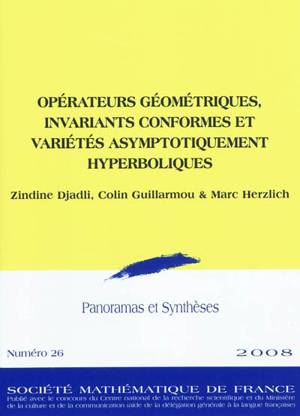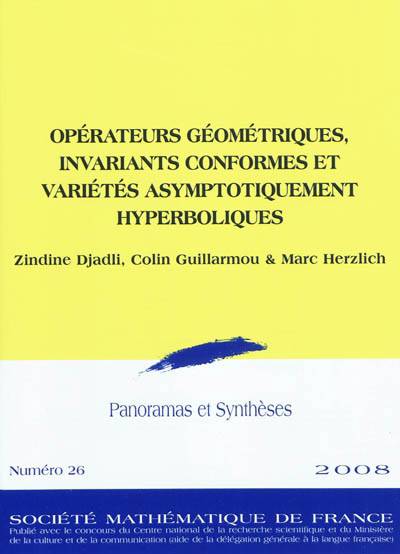
- Retrait gratuit dans votre magasin Club
- 7.000.000 titres dans notre catalogue
- Payer en toute sécurité
- Toujours un magasin près de chez vous
- Retrait gratuit dans votre magasin Club
- 7.000.0000 titres dans notre catalogue
- Payer en toute sécurité
- Toujours un magasin près de chez vous
Opérateurs géométriques, invariants conformes et variétés asymptotiquement hyperboliques
Zindine Djadli, Colin Guillarmou, Marc HerzlichDescription
En 1985, Fefferman et Graham ont introduit un programme ambitieux (dit de la « métrique ambiante ») d'étude des invariants locaux de la géométrie conforme. Celui-ci s'est considérablement développé ces dernières années, menant à la définition de nombreux objets nouveaux : opérateurs de Graham-Jenne-Mason-Sparling (GJMS) généralisant ceux de Yamabe et de Paneitz, Q-courbure de Branson... et à des applications parfois spectaculaires et inattendues : classification des variétés conformément plates de dimension 4 à caractéristique d'Euler positive, théorème « de pincement conforme » de la sphère, etc. Absentes de la stratégie originelle, la géométrie et l'analyse sur les variétés asymptotiquement hyperboliques d'Einstein (ou Poincaré-Einstein) se sont révélées un élément essentiel du programme. L'objectif de ce livre est de présenter un panorama des développements récents et une synthèse des principaux résultats, accessible à des lecteurs ayant une connaissance de base de la géométrie riemannienne.
In 1985, Fefferman and Graham initiated an ambitious program of study of conformal geometry (known as the « ambient metric » method). This has known tremendous developments in the last few years, leading to the definition of a number of new invariants : Graham-Jenne-Mason-Sparling (GJMS) operators generalizing the Yamabe and Paneitz operators, Branson Q-curvatures... and to remarkable applications to conformally flat manifolds of dimension 4 and nonnegative Euler characteristic, or to conformally invariant pinching theorems. An essential role is played in the theory by asymptotically hyperbolic Einstein metrics (or Poincaré-Einstein metrics) associated to a conformal class. The book is devoted to a présentation of the theory together with a description of the latest developments. It should be accessible to all readers having a basic knowledge of Riemannian geometry.
Spécifications
Parties prenantes
- Auteur(s) :
- Editeur:
Contenu
- Langue:
- Français
Caractéristiques
- EAN:
- 9782856292600
- Date de parution :
- 15-09-09
- Format:
- Livre broché
- Dimensions :
- 180 mm x 240 mm

Les avis
Nous publions uniquement les avis qui respectent les conditions requises. Consultez nos conditions pour les avis.






